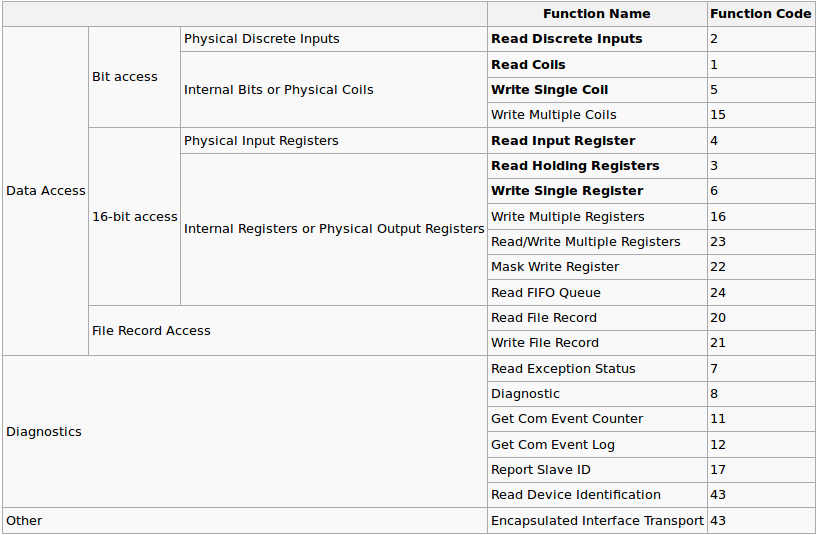Difference between revisions of "Modbus"
m (Minor editing; added a couple links) |
|||
| Line 1: | Line 1: | ||
| − | '''Modbus''' is a serial communications protocol published by Modicon in 1979. | + | '''[http://en.wikipedia.org/wiki/Modbus Modbus]''' is a serial communications protocol published by Modicon (now Schneider Electric) in 1979 for use with its programmable logic controllers (PLCs). Simple and robust, it has since become a ''de facto'' standard communication protocol, and it is now among the most commonly available means of connecting industrial devices. The main reasons for the extensive use of Modbus in the industrial environment are: |
| − | Simple and robust, it has since become a '' | + | |
| − | The main reasons for the extensive use of Modbus in the industrial environment are: | + | |
* It has been developed with industrial applications in mind | * It has been developed with industrial applications in mind | ||
* It is openly published and royalty-free | * It is openly published and royalty-free | ||
| Line 7: | Line 5: | ||
* It moves raw bits or words without placing many restrictions on vendors | * It moves raw bits or words without placing many restrictions on vendors | ||
| − | Modbus allows for communication between many (approximately 240) devices connected to the same network, for example a system that measures temperature and humidity and communicates the results to a computer. Modbus is often used to connect a supervisory computer with a [ | + | Modbus allows for communication between many (approximately 240) devices connected to the same network, for example a system that measures temperature and humidity and communicates the results to a computer. Modbus is often used to connect a supervisory computer with a [http://en.wikipedia.org/wiki/Remote_terminal_unit remote terminal unit] (RTU) in supervisory control and data acquisition SCADA systems. Many of the data types are named from its use in driving relays: a single-bit physical output is called a ''coil'', and a single-bit physical input is called a ''discrete input'' or a ''contact''. |
The development and update of Modbus protocols are managed by the [http://www.modbus.com/ Modbus Organization], formed of independent users and suppliers of Modbus compliant devices.<br /><br /> | The development and update of Modbus protocols are managed by the [http://www.modbus.com/ Modbus Organization], formed of independent users and suppliers of Modbus compliant devices.<br /><br /> | ||
[[File:Function-codes-modbus.png]] | [[File:Function-codes-modbus.png]] | ||
Revision as of 08:09, 17 July 2014
Modbus is a serial communications protocol published by Modicon (now Schneider Electric) in 1979 for use with its programmable logic controllers (PLCs). Simple and robust, it has since become a de facto standard communication protocol, and it is now among the most commonly available means of connecting industrial devices. The main reasons for the extensive use of Modbus in the industrial environment are:
- It has been developed with industrial applications in mind
- It is openly published and royalty-free
- It is easy to deploy and maintain
- It moves raw bits or words without placing many restrictions on vendors
Modbus allows for communication between many (approximately 240) devices connected to the same network, for example a system that measures temperature and humidity and communicates the results to a computer. Modbus is often used to connect a supervisory computer with a remote terminal unit (RTU) in supervisory control and data acquisition SCADA systems. Many of the data types are named from its use in driving relays: a single-bit physical output is called a coil, and a single-bit physical input is called a discrete input or a contact.
The development and update of Modbus protocols are managed by the Modbus Organization, formed of independent users and suppliers of Modbus compliant devices.
